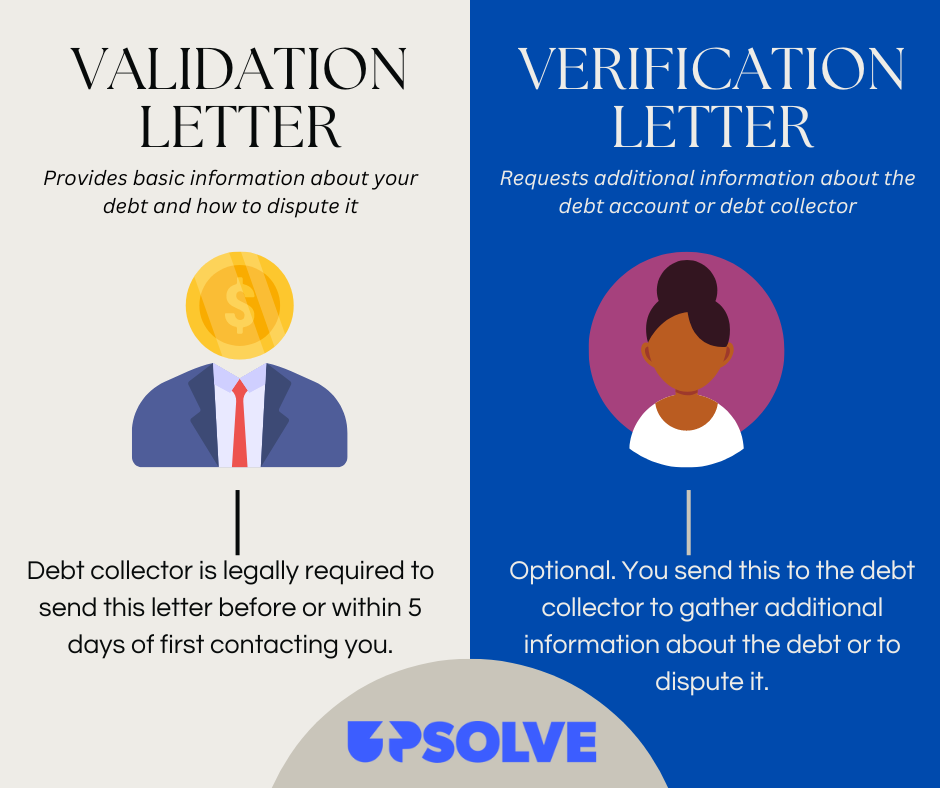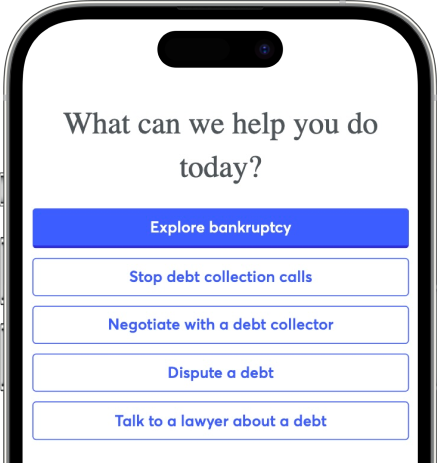How To Deal With Cavalry SPV I LLC
Upsolve is a nonprofit that helps you get out of debt with free debt relief tools and education. Featured in Forbes 4x and funded by institutions like Harvard University so we'll never ask you for a credit card. Get debt help.
Cavalry SPV I LLC (Cavalry Portfolio Services LLC) is a legitimate debt collection agency focusing on consumer debts, like credit card debt. If Cavalry SPV I LLC is contacting you, the first thing you’ll want to do is validate the debt. Once you verify that the debt belongs to you, you can choose how to deal with Cavalry. The main options you have are disputing the debt (if the information is incorrect or you disagree with the debt amount) or negotiating a settlement to pay less than you owe and resolve the matter.
Written by the Upsolve Team.
Updated February 8, 2024
What Is Cavalry SPV I LLC?
Cavalry SPV I LLC is a debt collection agency based in Greenwich, Connecticut. It’s also known as Cavalry Portfolio Services. If you receive a debt notice from Cavalry SPV I LLC or Cavalry Portfolio services, the information in this article should be helpful since both are the same company.
Here is their contact information:
Website: https://www.cavalryportfolioservices.com/
Phone number: 1-866-483-5139
Address: 1 American Ln Ste 220, Greenwich, CT 06831-2563
Your debt may end up with Cavalry if the original creditor — such as a bank like Wells Fargo, Citibank, Chase — can’t get you to pay on a past-due account. After their own collection efforts fail, the original creditor can sell your debt to a debt collection service like Cavalry.
Why Is Cavalry SPV I LLC Contacting Me?
If Cavalry contacts you, a lender — such as a credit card company like Capital One — has sold a debt that you owe. Now, Cavalry is continuing collection efforts.
Since Cavalry now owns your debt, if you need to work out a negotiation — like a repayment plan — you will need to work directly with the debt collection agency.
Is Cavalry Legit?
Yes, Cavalry SPV I LLC is a legitimate debt collection company. They do, however, have quite a few customer complaints against them, according to the Better Business Bureau (BBB) and the Consumer Financial Protection Bureau (CFPB).
According to the BBB, more than 350 consumers have filed complaints against Cavalry in the past three years (as of early 2024). In addition to other complaints, one consumer claimed Cavalry contacted them but did not provide the original collection letter documentation even after they requested it. A debt collector not giving sufficient information about a debt is a common Fair Debt Collection Practices Act (FDCPA) violation.
The FDCPA is a federal debt collection law that protects you from harassment and unlawful behavior from third-party debt collectors and collection agencies. If you believe a debt collector has committed a violation, you can report them to the CFPB and even sue for compensation.
Disclaimer: These reviews and complaints highlight relevant issues but may not represent all consumers’ experiences.
How Do I Know if I’m Being Scammed?
If someone claiming to represent Cavalry contacts you, don’t assume the call is legitimate. Some scammers use the names of real debt collection agencies to try to trick you. They’ll typically ask for sensitive information, like bank account information or your Social Security number, that a legitimate debt collection agency would already have.
It is always important to validate your alleged debt and ask for more information if the situation seems suspicious. Validating the debt is the best way to avoid a debt collector scam. You can report scammers to the Federal Trade Commission (FTC), a federal agency specializing in protecting consumers' rights.
Do I Have To Pay Cavalry SPV I LLC?
The first thing you need to do when a debt collection service contacts you is figure out if the debt they claim you owe is legitimate. Debt collectors sometimes have inaccurate information about the amount you owe or who you owe the debt to. You can protect yourself by making sure Cavalry has given you a debt validation notice.
Read the notice carefully to verify that:
The debt is an actual debt that you owe
The debt collector genuinely owns the debt
The amount of debt is accurate
If you haven’t received a debt validation letter or you want more information about the debt or account, you can send Cavalry a debt verification letter.
Upsolve Member Experiences
1,997+ Members OnlineStep 1: Send a Debt Verification Letter
If you haven’t already received a debt validation letter from Cavalry, you need to request one from them. You can also send your own debt verification letter.

A debt validation letter is a letter from the debt collector that includes basic information about a debt they’re trying to collect from you. By law, a debt collection company is supposed to send you a debt validation letter before or within five days of first contacting you. They must also give you a 30-day window to dispute the debt.
During the 30-day debt dispute window, the collection agency can't continue collection efforts (phone calls, letters, emails). If they aren't able to verify your debt within those 30 days, you shouldn't have to pay. Check your credit report and dispute any errors with the major credit bureaus.
If the debt collectors can verify your debt within the 30-day window, you must decide what to do next. Your next steps depend on whether you agree or disagree with the amount they claim you owe.
Step 2: Decide What To Do Next
If the debt collector is able to verify that you owe the debt they claim you do, you’ll need to decide how to respond.
The three main options are:
Dispute the debt
Negotiate or settle the debt
Ignore the debt (while this is technically an option, this is not recommended)
Option 1: Dispute the Debt
If you disagree with the amount or other details that the debt collector has indicated on your debt validation letter, it’s your right to dispute the debt. You can dispute the debt with Cavalry and with the three major credit bureaus if it’s misstated your credit report. The three major credit bureaus are Experian, Equifax, and TransUnion.
Under the Fair Credit Reporting Act (FCRA), you have the right to a free copy of your credit report from each of the three major credit bureaus once every 12 months.
The FCRA also gives you the right to dispute errors and remove incorrect entries from your credit report using the 609 Credit Dispute Letter.
Option 2: Negotiate the Debt and Make a Settlement Offer
If paying the debt in full isn’t an option for you (you’re not alone — it’s not an option for most people), negotiating a debt settlement could be a good route for you to take.
Most creditors will settle for 40%–60% of the original amount owed. This is where the negotiating begins: You can start with a low percentage (even as low as 25%) but be willing to meet at 50%–60%. This could help you not to pay the highest percentage by showing how much you’re willing to negotiate.
It may not feel like it, but you do have leverage in this situation. A debt buyer purchases debt from the original creditor for pennies on the dollar. They’re willing to negotiate because they usually profit even if you pay less than what you originally owed.
Negotiating a successful settlement with Cavalry may seem intimidating, but it is possible. Check out Upsolve’s Guide to Winning Against Cavalry to learn more.
Can You Negotiate Every Past-Due Debt?
No, you can’t negotiate every past-due debt. But negotiation is usually an option for the most common types of past-due consumer debt, including credit card debt, medical bills, personal and payday loans.
Debt that’s backed by collateral — such as a mortgage or car loan — is not usually negotiable. If you default on these loans, the lender can foreclose on your home or repossess your car.
Federal student loans also aren’t negotiable. But if you’re struggling to make your student loan payments, there are several student loan forgiveness options.
Tax debt, on the other hand, is usually negotiable, but the IRS has its own system for negotiating debt owed.
Option 3: Ignore the Debt (Not Recommended)
While this is technically an option, ignoring the debt is not recommended. Dealing with debt and collectors like Cavalry is overwhelming. It’s normal to want to ignore everything and hope it goes away.
Unfortunately, ignoring the debt collector won’t make the debt go away. Often, it will increase your stress, and it may end up costing you more in the end.
But take heart, you can handle this! If you’re reading this article, you’re well on your way to knowing your rights and taking your power back.
What Happens if I Ignore Cavalry SPV I LLC?
The worst thing you can do if a debt collector contacts you is ignore them. Ignoring a debt collector can:
Hurt your credit score
Cost you more in the long run due to interest charges, fees, or court costs
Create an opening for the debt collector to sue you
If you get sued and lose, the debt collector can get a court order to garnish your paycheck or bank account.
While negative information falls off your credit report after seven years, the debt doesn’t disappear, and agencies can continue collection efforts if the statute of limitations hasn’t run out.
Bottom line: The best thing you can do for yourself is to take action. You can take on Cavalry and win.
Can Cavalry Sue Me?
Unfortunately, Cavalry SPV I LLC can sue you. This usually won’t be their first step, but if collection efforts go unanswered, Cavalry may eventually bring a debt collection lawsuit against you.
Whether you’ll get sued depends on several factors, such as:
Your state’s wage garnishment laws
How long your debt has been in collections
The amount you owe
If a collector sues you, you will receive a summons and complaint. These are official court documents that notify you of the lawsuit and outline the case details. The documents are usually delivered to you in person.
You can always seek legal advice if you’re involved in a debt lawsuit, especially if you want to file a counterclaim against the debt collector.
Let’s Summarize…
Cavalry is a legitimate debt collection agency that collects consumer debt. If they contact you, validate that the debt first. Then decide what action to take. Know your rights and remain confident that you do have choices and you can resolve the matter.

